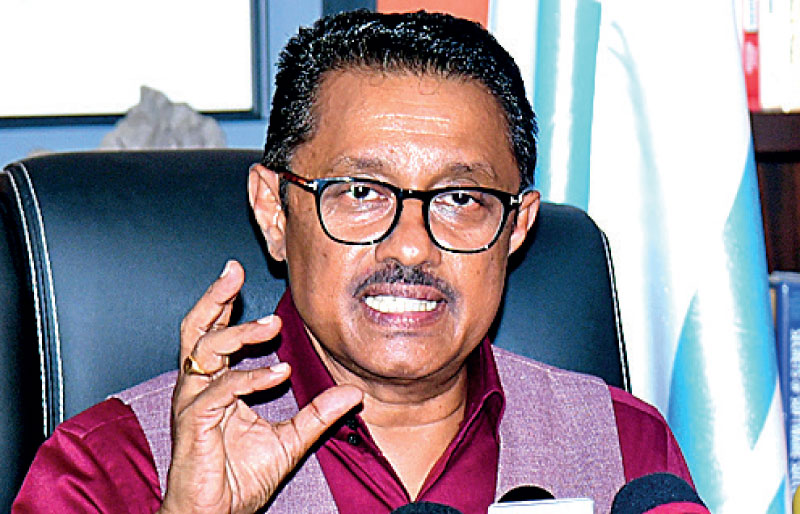Tuesday Feb 17, 2026
Tuesday Feb 17, 2026
Friday, 8 July 2022 04:57 - - {{hitsCtrl.values.hits}}

PUCSL Chairman Janaka Ratnayake - Pic by Ruwan Walpola
By Darshana Abayasingha
Continuing from his revelations at the COPE Committee meeting in Parliament on Wednesday, Public Utilities Commission of Sri Lanka (PUCSL) Chairman Janaka Ratnayake yesterday charged the Ceylon Petroleum Corporation (CPC) with gross mismanagement and misrepresentation of facts, claiming the corporation was fleecing the public with its pricing.
As stated by him before the Parliamentary Committee, Ratnayake claimed the CPC can issue petrol and diesel to the public on average Rs. 200 lesser than current domestic market prices.
At a media briefing yesterday, the PUCSL Chief ridiculed the Government’s fuel price formula, presenting customs documents that showed the declared price for a litre of 92 octane fuel at Rs. 228 versus the CPC’s claim of Rs. 363.51. Whilst the Energy Ministry’s breakdown showed a profit of just Rs. 15.56 per litre of 92 octane, the breakdown as per the Customs declaration showed a profit of Rs. 161.78 per litre.
Similarly, he demonstrated CPC listed prices for 95 octane, auto diesel and super diesel at Rs. Rs. 367.18, Rs. 403.65 and Rs. 408.25 respectively, whilst Custom’s declared prices stood at Rs. 235.23, Rs. 255.85 and Rs. 262.66. Kerosene was listed at Rs. 396.20 by end May, whilst the Custom’s documents listed it at Rs. 239.79.
He told the Daily FT the Government must take greater control over imports of essential items, and added the country has potential to manage its energy and pharmaceutical imports at $ 400 million a month.
“The CPC is a blackhole, it is making significant profits but where is it going? It’s still in debt.” If the country focuses on imports of crude oil and it is priced right, the Government can offer the public a limited but guaranteed supply of oil for around $ 400 million a month and the market would adjust, he explained.
“So, we also have a situation where the Ceylon Electricity Board must buy furnace oil and diesel from the CPC at much higher rates for power generation. The CEB purchases over 2,500 metric tonnes in one go, and the additional cost incurred is substantial.
“Despite the significant profits made by the CPC through such actions, the Corporation is still in debt to billions in rupees in losses due to its high operating costs and grave mismanagement. The public too is forced to bear this burden at the pump and their energy bills,” Ratnayake said.
He called on the Government to urgently restructure the organisation, plus ensure the public receives fuel at reasonable prices.
“I have already made a complaint to the Human Rights Commission as a private citizen that my rights as a citizen are being violated, and I have informed COPE and all relevant State institutions including the Central Bank and the Ministry of Finance on the need to discuss this matter further and arrive at a solution,” he said.
Ratnayake further revealed the inflated prices as depicted by the CPC entails the corporation to pay out higher commissions to fuel stations.
